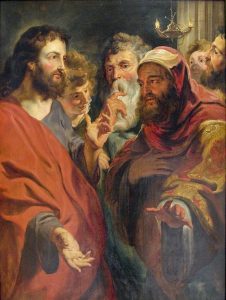Thoughts on Sunday’s Lessons for May 30, 2021
First Reading: Isaiah 6:1-8
On Pentecost Sunday last week, we heard of the coming of the Holy Spirit in wind and fire. Now we mark Trinity Sunday, pondering the relationship among Creator, Redeemer and Advocate.

Christ Instructing Nicodemus (17th century), painting by Jacob Jordaens (1593-1678). Musées Royaux des Beaux Arts de Belgique. Brussels. (Click image to enlarge.)
In our first reading, we meet another in the Hebrew Bible’s string of reluctant prophets. Like Moses, who objected to his call, saying he could not speak well enough; or Jeremiah, who worried that he was too young, or. Jonah, who simply ran away. In these verses Isaiah fears that his sinfulness – “unclean lips” – disqualifies him for God’s service. But then a mighty angel purifies Isaiah’s lips with a hot coal, whereupon he eagerly accepts God’s call: “Here I am! Send me!”
Psalm: Psalm 29
We heard this Psalm not long ago, on the first Sunday after the Epiphany in January. Now we read it again on the first Sunday after Pentecost. What is the unifying element? Both readings follow on the Sunday after we celebrate a bold manifestation of the divine: Epiphany and Pentecost. At such a time it seems appropriate, as the Psalm commands, to “ascribe to God the glory due God’s name.” The powerful metaphor of a majestic storm reflects the Holy Spirit as a great wind. A storm strong enough to break and spin mighty oaks and cedars, shoot flames, and shake the wilderness might send us running for shelter. But it also has potential to lure us outside to feel the rain and the wind on our faces as the storm rolls past.
Alternative to the Psalm: Canticle 13
Canticles, “little songs,” are scripture passages, other than Psalms, chosen for use in worship in the Book of Common Prayer. Canticle 13 incorporates parts of the “Song of the Three Young Men” who were thrown into the fiery furnace by an angry king. Protected by God, as told in Daniel and the apocryphal Song of Azariah, they survived this ordeal, walking unharmed through the fire and singing this hymn of praise to God and all creation.
Second Reading: Romans 8:12-17
These verses came just before last week’s reading from Romans, in which Paul likened the hope and pain of Christians waiting for salvation to the pain and expectancy of a mother in labor. In these verses that provide context for that reading, we hear Paul building toward that image. He tells of the great gift that we are offered: Accepting life led by the Spirit, we become children of God, just as Jesus is the Son of God. With Jesus we become heirs of God, inspired by the Spirit, knowing that our suffering with Jesus opens us up to being glorified with Jesus.
Gospel: John 3:1-17
Nicodemus, a Pharisee who seems impressed by Jesus, comes to talk with Jesus at night, perhaps to keep his visit secret in the darkness. In their conversation, Nicodemus just can’t get his mind around the idea of being “born again,” a term that in the original Greek might mean “anew,” “again,” “from above,” “in the future,” or even all of those. Nicodemus, in an exchange that the author of John might have intended to draw chuckles from believers, couldn’t figure how a grown person could creep back into the mother’s body to be re-born. But Jesus understood that there is no contradiction between being born of the flesh as an infant and being “born again,” not in the flesh but through faith and the Spirit. The Gospel concludes with the familiar John 3:16, “God so loved the world that he gave his only Son,” followed by the context of 3:17, “God did not send the Son into the world to condemn the world, but in order that the world might be saved through him.”
